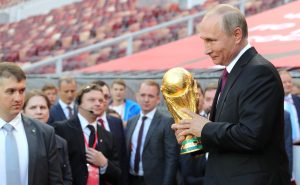
It is the second week of the soccer World Cup in Russia, which has already offered its surprising goals and disappointing misses to billions of soccer fans around the world, and there are still several weeks of excitement to come. Apart from exciting emotions though, such major sporting events do present opportunities far beyond sports.
The tournament is globally inclusive and Russia is currently in the center of the spotlight. Given Russia’s strained relations on this global scale, as well as the economic costs it bears due to imposed sanctions, it is interesting to see whether hosting this major event will do any good for the country.
For a start, organizing such a major sporting event brings in visitors, and this World Cup is not an exception. According to one account, The World Cup organizers are expecting 570,000 foreign fans to attend matches in different Russian cities. Attracting such numbers of foreign visitors does naturally imply at least a temporary economic boost, given all the tourists’ spending and infrastructure projects. Yet, according to a recent World Economic Forum article, hosting a World Cup doesn’t always make economic sense, as the associated costs quite often outweigh the economic gains.
If there aren’t substantial gains in economic terms, are there any potential gains for the international brand of Russia?
Giving a news conference after winning the World Cup bid in 2010, Vladimir Putin, holding the Prime Minister position back then, said “That (visiting Russia for the World Cup) will be a good way to see Russia, to tour its cities and to understand the country better. Russia is developing, it is on the upsurge, and it will become even stronger by 2018.”Hence, in terms of public opinion, hosting the World Cup is surely an opportunity for promoting the country and showcasing good places for future tourism and business. As such, the country could benefit largely in terms of improved impressions of Russia that the visitors take home with them.
Will the impressions of global leaders improve as well though?
As noted in a recent Guardian article, the strain between Putin and Western leaders is still visible, as theWorld Cup opener guest list consisted largely of central Asian autocrats, the heads of the breakaway republics Abkhazia and South Ossetia, and some foreign leaders from Africa and South America. Indeed, rather than expecting that the love for soccer would bring Western leaders closer to Putin, many view this World Cup as Russia’s opportunity for another goal. According to accounts by the Financial Times and CBS news, President Vladimir Putin uses the event to show the West that Russia is not isolated and existing sanctionshave failed. So maybe this World Cup is not about an invitation for improved relations, but to make strong statements instead? As stated in the FT article, ‘The Kremlin does believe that for Russia to successfully stage the tournament in the face of widespread criticism over its perceived malevolence abroad will be a defiant geopolitical triumph.’


“Sport should be witout politics” – Putin says
Never thought a game can have this much impact on a country as a whole.